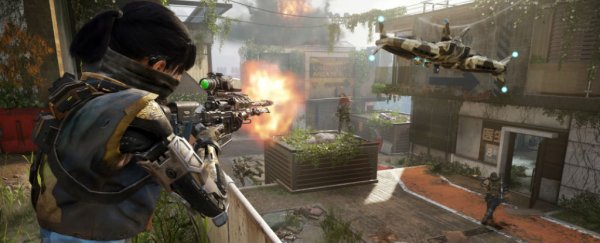Jane McGonigal, a world-renowned designer of alternate reality games who has a PhD in performance studies, wants to change people's conception of video games as "just escapist, guilty pleasures".
"My number one goal in life is to see a game designer nominated for a Nobel Peace Prize," McGonigal writes on her website. She tells Business Insider she wants people to realise that games can be "powerful tools to improve our attention, our mood, our cognitive strengths, and our relationships." And research is on her side.
Studies suggest that mainstream games like Call of Duty may improve our cognitive abilities significantly more than games specifically designed to do so by designers like Luminosity.
To help spread the truth about common misconceptions, seven neuroscientists from around the world signed the document A Consensus on the Brain Training Industry from the Scientific Community in 2014 to say they "object to the claim" that brain teaser games can improve cognitive abilities, as no scientific evidence has been able to confirm such a claim.
Even better for gamers, research from North Carolina State University and Florida State University suggests that mainstream games geared toward entertainment can help improve attention, spatial orientation, and problem solving abilities.
In her book, Super Better, McGonigal writes that the researchers she talked to about this seeming contradiction offered a simple explanation: "Traditional video games are more complex and harder to master, and they require that the player learn a wider and more challenging range of skills and abilities."
If you want to have fun and stimulate your mind, McGonigal recommends playing one of these six games three times a week for about 20 minutes.
McGonigal says playing fast-paced games like Call of Duty, a first-person shooter game, can help improve visual attention and spatial intelligence skills, which can lead to better performance in science, technology, engineering, and mathematics.
 Call of Duty: Black Ops III/Activision
Call of Duty: Black Ops III/Activision
Another fast-paced game, Forza, a car racing game, may help improve your ability to make accurate decisions under pressure.
 Forza/Microsoft Studios
Forza/Microsoft Studios
Taking on the role of a criminal in a big city in Grand Theft Auto may help train you to process information faster and keep track of more information - up to three times the amount as non-gamers, some studies suggest - in high stress situations.
 Grand Theft Auto/Rockstar Games
Grand Theft Auto/Rockstar Games
Strategic games like StarCraft, a military science fiction game, can also improve the ability to solve imaginary and real-life problems, possibly because they teach users to both formulate and execute strategic plans.
 Starcraft/Blizzard Entertainment
Starcraft/Blizzard Entertainment
Games that require strategic thinking, like science fiction third-person shooter game, Mass Effect, also test and refine your information-gathering skills.
 Mass Effect/BioWare
Mass Effect/BioWare
Lastly, 'thinking games' like Final Fantasy, a fantasy role-playing game, can help train you to evaluate your options faster and more accurately.
 Final Fantasy XIV/Square Enix
Final Fantasy XIV/Square Enix
This article was originally published by Business Insider.
More from Business Insider:
